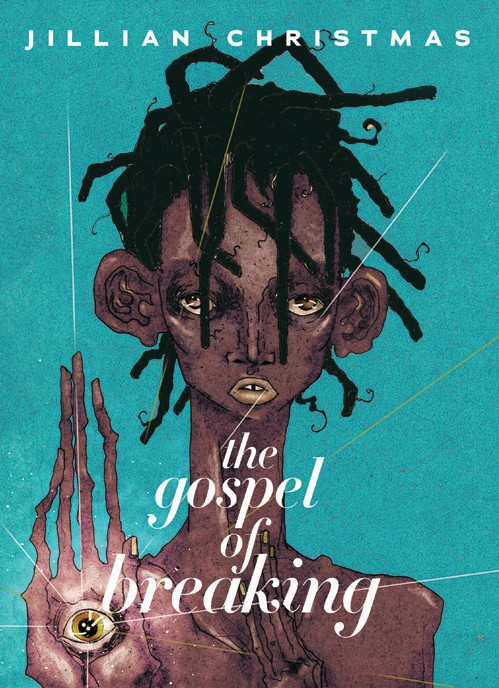The Gospel of Breaking by Jillian Christmas
The Gospel of Breaking
by Jillian Christmas
Arsenal Pulp Press, 2020; 105 pages; $14.95
review by Natasha Sanders-Kay
From the former artistic director of Vancouver’s Verses Festival of Words comes a debut collection that sings and glistens, where love is embodied in oceans, the page is a conversation, and art is saviour. Spoken word poet Jillian Christmas traces the love and lineage of ancestors, blood family and chosen family, friends and lovers, community and self, illuminating several sites of breaking — and healing. There is the murder toll that keeps her from “finish[ing] poems about black joy”; white feminist demands that she cut herself up, omit her blackness or use it as “blood for the cameras,” fuel for the fire, “the best kind of help”; the unfortunately classic kitchen tale of the mother who shames her daughter’s body, finding use for “every growing thing on this island . . . / . . . every plant in her yard,” even for the tomatoes “soft and oozing in the / fridge,” but “has no idea what / to do with the wilting girl in her kitchen,” her body “raw and open” from the “blade” of the comment “separating one layer of skin / from the next”; there is the homeland that sent her seeking “the queerest light”; the “god who would make closets into coffins.”
But — she is “born again / into the religion of lost souls / baptized under bourbon-kissed streetlight / anointed in smoke plumes,” where holiness is everywhere, between the legs and in “every busted lip / and backroom hand job.” In a world that “tears strips clean off” her, “complains about the toughness of the meat,” she keeps “learning to love better / and faster than a screaming bullet.” When her family is turned away from the same pool that turned her mother away as a little girl, Christmas pulls up images on her phone, “some unknown and still-beloved brown face / smiling after another [ . . . ] brown-skinned boy and his father blow each other kisses / with a tenderness that quenches my dreams / the remedy . . . is loving these black bodies more than water . . . deeper still.” Reflecting on her mother and their shared relationship with depression, she imagines them both into the wholeness of mangoes. Certainly, Christmas demonstrates the power and necessity of imaginative thinking, the conditions that can create the utopia of “did you hear . . . there is a man ALIVE?!,” “some brave black wild dream / some sweet dark splendid sugar plum thing”; a world where “no body breaks and we carry each other.”
Christmas has performed spoken word for several years, but for many of us this is our first time seeing her magic dance across the page. In written form, some of the poems work better than others. There are parts I especially long to hear aloud, particularly italicized portions that confuse me, suggesting another speaker I’m not sure is there. Some of the especially lyrical portions beg to be sung (fortunately, several of Christmas’s readings are available on YouTube, and some post-pandemic day I’m sure she’ll back to slamming all over the country). There are a few other first-book blemishes — in “northern light,” for instance, the beautiful, concrete imagery of queer migrant kin “knocking [. . . ] knees together in parkas / teeth chattering / where the thin trees [. . .] stretch / high the heavens / to seek the queerest light” shifts into the more overstated quest to “stretch our capacities for tolerance [. . . ] for a place we can all call home / . . . regardless of difference.” Read aloud, however, the text is rescued by the rhyme of “fierce resistance.” Normally I dislike rhyming poems, but seeing Christmas’s spoken word in print is gifting me new appreciation for rhyme, rhythm, and cadence, and the skill involved in wedding spoken and written word on the stage of the page. Spacing the words of a poem is a craft in itself, and while there are a few spots that feel awkward to me, for the most part the poet downright enchants me with artful, evocative scoring, like in the opening poem:
are you one dear reader a body
that would gather
next to mine erase the line
for a moment
so that urgent truth can be born on new lips
This invitation from the artist with “laughter and blood in [her] cheek / and more than enough of it to feed the masses” is well worth accepting, the incantations in this spell book well worth being bewitched by.

